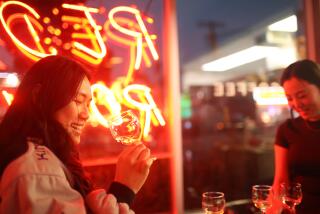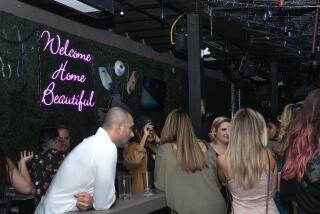Pakistan militants turn fruit juice bars into a front line
LAHORE, PAKISTAN — They are considered risque dens of iniquity and have been bombed simply for providing a place where men and women can (gasp) talk to each other.
Fruit juice bars may seem an unusual front line in Pakistan’s war on Islamic militancy, but many of their owners feel deserving of combat pay these days for serving up cold smoothies. Although there haven’t been any attacks for several months, fears linger and many people say they’re aware that violence could come at any time.
Attacks on fresh juice bars in Lahore late last year centered on the Garhi Shahu neighborhood, where bearded men crouched on low stools in front of small shops gossip, gulp down sweet tea and launch tobacco clouds skyward from communal hookahs.
It’s also a part of Lahore where many Afghans and Uzbeks have settled, residents say, creating a subculture of Islamic fundamentalism in a historically more tolerant city.
Anti-Taliban cleric Sarfraz Naeemi was killed in the neighborhood last month by a suicide bomber.
Navigating through a jumble of parked motorcycles brings you to Dasko Juice, decorated with dusty, low-hanging fruit of the plastic variety, a picture of London’s Tower Bridge and pyramids of canned orange juice.
The reason Dasko was among those attacked with bombs late last year is six booths in an adjoining room, some of which have small curtains for privacy, where men and women can chat discreetly.
“Basically it’s just a place where girls and boys come and drink juice,” says Mohammed Naeem, Dasko’s owner, dressed in a shalwar kameez, the traditional loose-fitting pants and long shirt. “These people try and portray us as immoral, but it’s not true. They’re just sitting and talking, but that’s a threat to them.”
As he speaks, a woman dressed in a burka enters with a male companion. She looks embarrassed at the presence of a foreigner and immediately leaves.
In one of the two booths without a curtain, businessman Mohammed Yasim, 45, sits talking with a woman in a head scarf. Asked whether it’s a sensitive issue to be seen here with a female companion, he gets visibly irritated. “She’s my sister, she’s my sister,” he blurts out. “We’re only talking family business.”
The coordinated attacks on Dasko and several competitors -- part of a chain of neighborhood threats and violence targeting cinemas, DVD stores and barbershops -- started about 10 one night in October with an explosion at the Chino Juice Corner down the street that some initially thought was a gas cylinder blowing up.
One person died and several were injured. Chino is now out of business.
Minutes later, an explosion was heard at the nearby Al Rehman juice bar, followed by the bomb at Dasko, left on the wall of an empty shop next door. The blast blew apart the wall, destroying booths and causing other damage.
The operators received no warnings, although posters in the neighborhood had been prodding people for months to end their sinful ways and one of the other juice bars had been ordered to stop letting boys and girls “indulge in immoral acts” on its property.
“We never knew who placed the bombs,” says Khuram Butt, a waiter. “Fortunately the one that hit us was relatively small and seemed to be aimed more at scaring than killing.”
An adjoining shop that sold DVDs suffered collateral damage of sorts.
“The militants also hate DVDs, so I got very scared and switched to selling clothes,” says Abdul Kalam, his window decorated with five pairs of dusty jeans and three handwritten signs seeking someone to take over his lease. “I probably lost $7,000 and make no money at this, all because of fear.”
Juice bars, a feature in many Pakistani cities, seem a reasonable way for many lower middle-class young people to relax.
“It’s something to do and it doesn’t cost much, maybe 70 cents,” says Zulqernain Tahir, a reporter in Lahore with the newspaper Dawn. “These attacks are very unfortunate.”
Most of the stores probably have been targets of opportunity, analysts say.
“It’s really a matter of conveniently hitting people,” says Mohammed Jawwad, an assistant professor of psychology at Lahore’s University of the Punjab. “Basically they don’t like coed gathering, even though coed gatherings are a part of Islam, including the hajj itself. There’s a real narrowness of thinking.”
Dasko’s sales fell after the explosion. But without another juice bar attack in several months, business has begun to increase.
The staff has stepped up security, proudly displaying a “Super Scanner” brand metal detector wand, although its use seems a bit random.
“I could tell you weren’t dangerous so I didn’t use it on you,” Butt, the waiter, says to a Westerner. “You didn’t seem to be carrying anything.”
The staff says it’s now keeping a closer eye on customers leaving bags behind and keeps only one door open to better monitor those entering. It has also put up some new drywall and repaired decorative arches damaged by the blast.
“They were trying to stop our way of life,” says Naeem, the owner. “Sure, it’s dangerous to stay in this business, but what can we do. We have no other way of making a living.”
--
More to Read
Sign up for Essential California
The most important California stories and recommendations in your inbox every morning.
You may occasionally receive promotional content from the Los Angeles Times.










